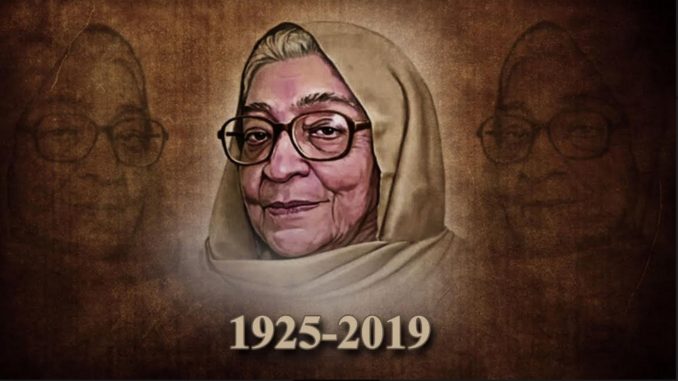
Courtesy: Newsclick
Krishna Sobti
(Translated from Hindi by Alok Bhalla)
IF Ammu had been born at a different time and in another age, she would have been regarded as a remarkable woman, for she combined, in every aspect of her being, the best of feminine and masculine qualities — grace, dignity, courage, energy and skill — in equal measure and proportion.
Ammu’s personality was an astonishing mixture of strength and hard work as well as inner clarity and integrity. Instead of admonishing others, she was strict with herself and firmly disciplined in all her thoughts and actions. So strong was her control over herself that she never allowed herself to be effusively sentimental.
Her sharp sense of right and wrong, her apparent ability to make calm and objective assessments always left us amazed. Her indomitable will-power and her moral rectitude were apparent even from way she dressed and carried herself. Her clothes were simple and austere and she wore almost no jewellery. The glamour of fashion could never tempt her. She knew how to live according to her own quiet and singular ways.
She neither smothered us children with motherly affection nor spoilt us with excessive love. The flow of her life was even and her gestures were always restrained. Her knowledge, which was so deeply ingrained in her being, was an unselfconsciously acquired inheritance of her traditions. Beneath her composed and unruffled life one could sense a uniqueness which was firmly based on her confident ‘belief in her own self’.
In all situations and circumstances, Ammu asserted the right to give or withhold her consent to any decision which concerned the family. Her thinking was profound; her words were always direct, brief and to the point. That Ammu was the mother of two children who were opposites in their temperament and abilities had nothing to do with the dreams she may have had but was merely an aspect of the reality of her household. She never made any pretexts or spoke about her personal difficulties. And she was unforgiving if one did something wrong deliberately. At times, she would send us to our father to justify our actions. She neither exaggerated nor asked for any apologies. Even today, I am surprised at her ability to read and understand each situation and event correctly, without any ambiguity or unnecessary dramatisation.
Temperamentally, our father was quite the opposite of our mother. He was so refined and easy going that he treated us as his intimate friends who could say anything to him, tell him everything. Mother never resented the role he played in our lives. Indeed, instead of trying to defend herself, she helped sustain this caring image of a father who heard all our complaints and listened to each word or phrase.
Even though she had profound faith in herself, her decision for or against someone was never mean or insignificant. It seemed as if she had thought about something carefully before giving it the dignity of words.
The inner core of Ammu’s self could never be translated as either feminine or masculine. Her very being radiated the strong qualities of both simultaneously. For example, she could never bring herself to tell petty lies or be merely clever. It was always apparent that what she said or did was rational, straightforward, sober and utterly genuine. Her life was governed by two fundamental principles: a profound sense of gratefulness at being alive and an insatiable desire to understand things in their larger context. She did not lack courage or the spirit of adventurousness. The real source of her inner resilience lay in her motto of life — pick up a handful of dust and it will turn into gold; throw away the gold and it will again enrich the earth.
********
Born on 18 February 1925 in Gujrat, Pakistan, Krishna Sobti was best known for Mitro Marjani — a 1966 novel that probes the sexuality of a married woman. Widely considered the grande dame of Hindi literature, Sobti was known to write on the Partition, female sexuality, and relationships between man and woman.
Krishna Sobti started her career writing short stories. Her famous story, Sikka Badal Gaya, deals with Partition. In the 1960s, Sobti published a series of short stories under the pseudonym, ‘Hashmat’, earning praise from authors and critics alike.
In her lifetime, Sobti was criticised for profanity in her writings and many called her out for being “obsessed with sex”.
Sobti received the Sahitya Akademi Award for Zindaginama in 1980; sixteen years later she was appointed a fellow of the Sahitya Akademi. In 2015 however, she returned her award and resigned from the fellowship. She declined the Padma Bhushan in 2010, accepting the Jnanpith Award for her “path-breaking contribution to Indian literature” two years later.
Krishna Sobti married Dogri writer Shivnath, when she was past her 70th birthday. Shivnath died a few years later and Sobti had lived alone ever since.
Alok Bhalla in The Beacon WHEN KABIR SAW, HE WEPT… Ahimsa in the City of the Mind: Language, Identity-Politics and Partitions
Stand by Me: Song of a Farmer
The Self As Stranger I Am A Hindu

Leave a Reply